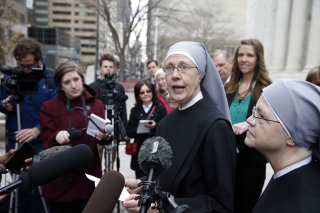Catholic patients desire health care that aligns with their faith and provides them and their loved ones with holistic care.
For centuries, the American medical system provided them with exactly that. But today, the field has had to part ways with its mission of delivering compassionate care tailored to each person, in large part because of hostile government overreach from Washington, D.C.
Government healthcare mandates including the Affordable Care Act (ACA) impose problematic ethical concerns for patients of faith because, among other things, they require them to pay for morally objectionable products and procedures through their health insurance coverage. To avoid this, many have sought out alternatives to traditional health insurance which are not subject to unethical government mandates and align with their convictions.
Some of the most problematic products and procedures which are considered healthcare under the ACA include contraception, abortions, sterilizations, sex changes, and euthanasia. The truth is that these services harm instead of heal the patients they are meant to treat, making it understandable that religious patients prefer not to cooperate with a medical system so at odds with their faith.
In recent years, some patients have been outraged enough to push back.
The Little Sisters of the Poor, a group of Catholic religious sisters who run homes for the indigent elderly, are just one group that has faced religious discrimination under the ACA. A component of the law required the Little Sisters to provide all FDA-approved contraceptives and abortifacients to their employees in their health insurance plans. The sisters battled the government in court for seven years before finally securing a victory for their community and conscientious objectors of all faiths at the U.S. Supreme Court in 2020.
This year, the Biden administration’s Department of Health and Human Services (HHS) finalized Section 1557 of the ACA, a rule that mandates procedures including elective abortions and transgender surgeries be covered through health insurance – regardless of any conscientious objections. No one should be forced to pay for healthcare products and services that violate their faith.
Still, there is reason for hope. These harmful mandates have forced religious patients to find creative solutions. Faith-based health sharing ministries are becoming common alternatives to health insurance that give religious patients what they deserve: access to healthcare free from ethical dilemmas and provided by medical professionals who seek to imitate Christ, who healed the sick and the ailing.
Health sharing ministries are like-minded communities of believers in which members pay a monthly contribution that can be used on their own healthcare expenses or given to another member in need of assistance. This operating framework is based on the “Good Samaritan Principle,” which calls upon every person – physician, nurse, coworker or friend – to offer assistance to their neighbors in times of need.
A common set of beliefs among members ensure that patients never have to share in expenses that violate their consciences. In fact, my health sharing ministry Solidarity HealthShare allows members to access life-affirming treatments most often disqualified for coverage under traditional insurance, including life-affirming fertility treatments like NaPro technology, mental health counseling and sterilization reversals.
Religiously devout families shouldn’t have to cooperate with a medical scheme that provides services contrary to their faith or enable a medical system increasingly hostile to their values. Fortunately, it is still possible to access affordable, quality healthcare that honors both provider and patient.
Chris Faddis is president of Solidarity HealthShare, a health care sharing ministry guided by the moral teachings of the Catholic Church that negotiates directly with providers to ensure delivery of high-quality and affordable, life-affirming health care for the more than 46,000 members it has served since 2016.





